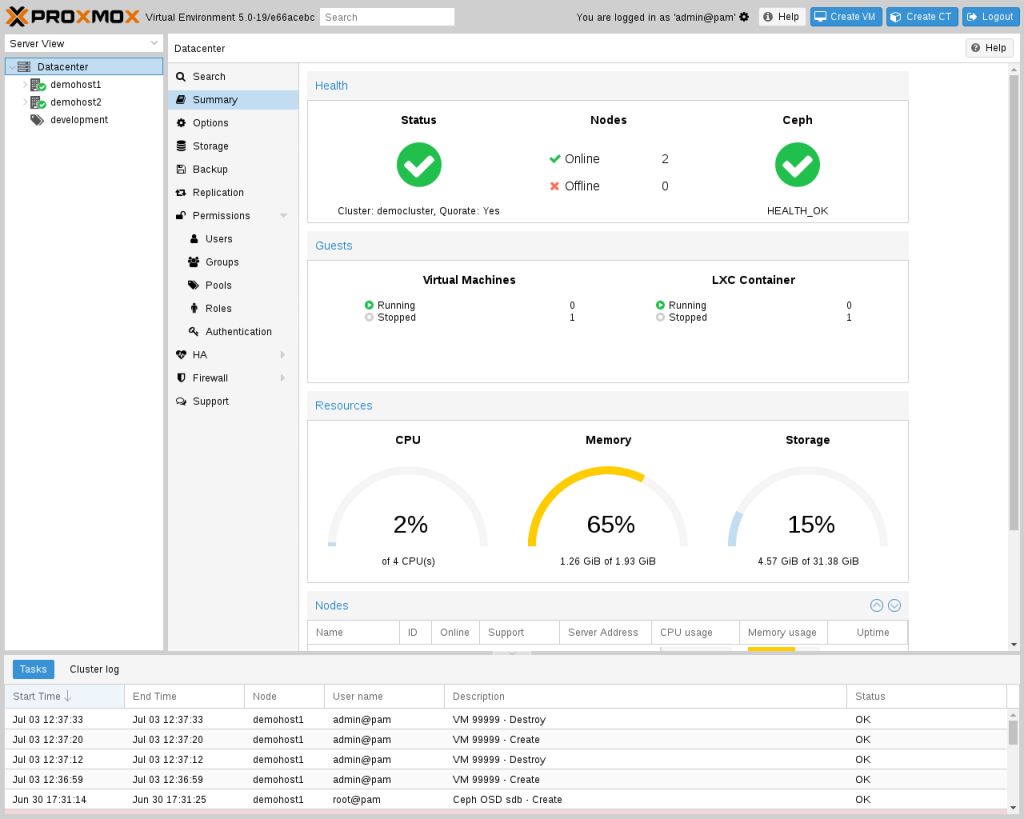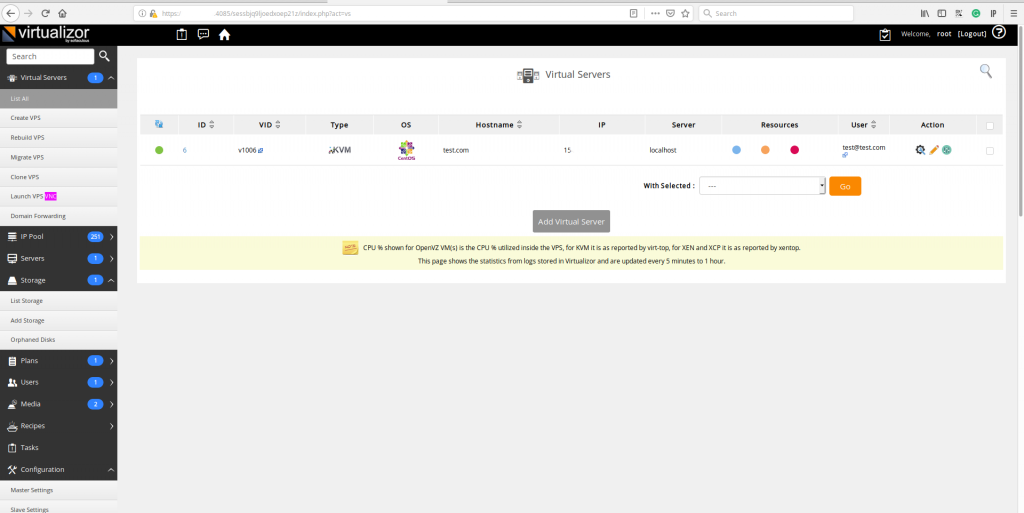A control panel makes virtual server management easy. But, the control panel options are endless and often confuse newbies. Each of the panels have their own features. And, the choice depends on the purpose of servers. At Bobcares, we often get requests from customers to choose between Virtualizor and Proxmox as part of our Infrastructure Management Services. Today, we’ll do a study on Virtualizor vs Proxmox and how our Support Engineers help customers in making the right choice.
Proxmox – A quick look
Firstly, let’s have a quick on Proxmox. Proxmox Virtual Environment is a powerful open source server virtualization tool to create virtual machines. It is popular for its performance and usability. Additionally, Proxmox VE supports both Kernel-based Virtual Machines (KVM) and container-based virtualization. Also, Proxmox comes with options to setup backup, high availability too. The standard interface of Proxmox will appear as 
Virtualizor – A quick look
Similarly, let’s get an idea about the Virtualizor too. Virtualizor is a powerful web based VPS Control Panel. It helps users to deploy and manage VPS on servers. Again, Virtualizor supports technologies like KVM, Xen, Proxmox, LXC, etc. It also comes with features like high availability, automatic backups and many more. The Virtualizor panel that we setup for one of our customers look as shown below. 
Analysis of Virtualizor vs Proxmox
We just had a quick look at both Proxmox and Virtualizor. And, they compete each other on the features and usability. Therefore, the decision to choose between Virtualizor and Proxmox becomes difficult. We’ll now see how our Dedicated Engineers do an analysis of Virtualizor vs Proxmox and help customers to make the right choice. Although, both Proxmox and Virtualizor are feature rich, the choice depends on the exact requirement of the customer. Let’s check these factors in detail.
1. Purpose of installation
Primarily, the most important factor to consider while choosing Virtualizor vs Proxmox is the purpose of installation. In other words, it depends much on what are we expecting the software to do. For example, if we need to create few virtual servers and sell them to customers, then Virtualizor would work well. As Virtualizor comes with a rather simple end user panel, it fits more to the hosting industry. Additionally, every server owner can manage his virtual server using his own panel. Unlike Virtualizor, we see our customers using Proxmox mainly for managing the internal servers. But, Proxmox also works in the hosting industry too. For customers with a larger network, maintaining all internal servers manually becomes a tedious task. Here, Proxmox make things simpler. Adding network address or bridge all can be done easily in Proxmox interface. Also, Proxmox support Ceph object storage out of the box and that comes useful for many app providers. That’s why, Proxmox gains popularity among customers having medium to large network.
2. Ease of use
Secondly, ease of use also becomes a deciding factor in choosing between Proxmox and Virtualizor. Proxmox panel comes with multiple levels of management. For instance, in data-center level we can manage cluster wide settings. Similarly, it has levels like Nodes that manage settings of a node. Also, it helps to edit settings of guest servers in the Guest level too. In all these levels Proxmox helps to setup storage, backups, firewall, etc. Thus, on the whole, Proxmox suits customers who want to customize and manage their own servers and network. From our experience in managing virtual servers, our Dedicated Engineers see Virtualizor used by customers who wish to do things by one click. A major share of features comes with automatic set up here. And, that will be helpful for newbie customers without much technical knowledge. In Virtualizor, users can make use of the different areas in the control panel. Administrative area helps to manage actions on the server as a whole, Cloud user area for managing virtual machines, allocating resources etc. Further, it comes with Enduser area that helps to manage tasks of a single VPS server like Start, Stop, etc.
3. Setup Costs
Similarly, major criteria in Virtualizor vs Proxmox analysis is the cost of the panel. Now, let’s check the prices in detail. Luckily, Proxmox is an open source software. Thus, it is freely available for download and use. The free version works almost as the paid version. But, it will not have access to the tested update repositories. And, this may not affect the working in internal networks. However, understanding the reasons for scaling up, our Support Engineers generally encourage customers to purchase a subscription in a business environment. Virtualizor comes with a paid license. For a life time license per node, it costs $200. Similarly, monthly unlimited license/node begins with $9 too. Either way, if customer has valid business, it is worth spending the license costs. In short, Proxmox works for users who wish to try things for free.
4. Type of virtualization
Yet another factor to consider in choosing between Proxmox and Virtualizor is that type of virtualization it supports. This again depends on the servers that we would like to create. Luckily, Virtualizor supports a longer list of virtualization types. It includes OpenVZ, Xen PV, Xen HVM, XenServer, Linux KVM, LXC, etc. Virtualizor can even work with Proxmox node too. Proxmox VE supports two virtualization technologies – Kernel-based Virtual Machine (KVM) and container-based virtualization with Linux Containers (LXC). Thus, it gets an upper edge in provisioning Windows and Linux applications. Again, our Dedicated Engineers do an analysis of customer requirement before suggesting the best solution for them.
5. Support services
Moreover, Support Services also becomes a crucial factor in Virtualizor vs Proxmox analysis. This determines the possibility of taking care of usability issues in real time environment. In the case of Proxmox free version, customers do not have access to support services. They have to go for paid subscriptions to avail support services. But, our Dedicated Engineers make good use of the Proxmox community service and provide solutions for our Proxmox customers too. Fortunately, Vitualizor comes with support services. This becomes really handy for getting quick solutions in real time scenarios. [Still confused on choosing the right product for your virtual servers? We are here to help you.]
Conclusion
In a nut shell, both Virtualizor and Proxmox has its own pros and cons as a virtual server management platform. Today, we did an analysis of Virtualizor vs Proxmox. We also saw how our Virtualization Engineers help customers to make the right choice for their business.








0 Comments